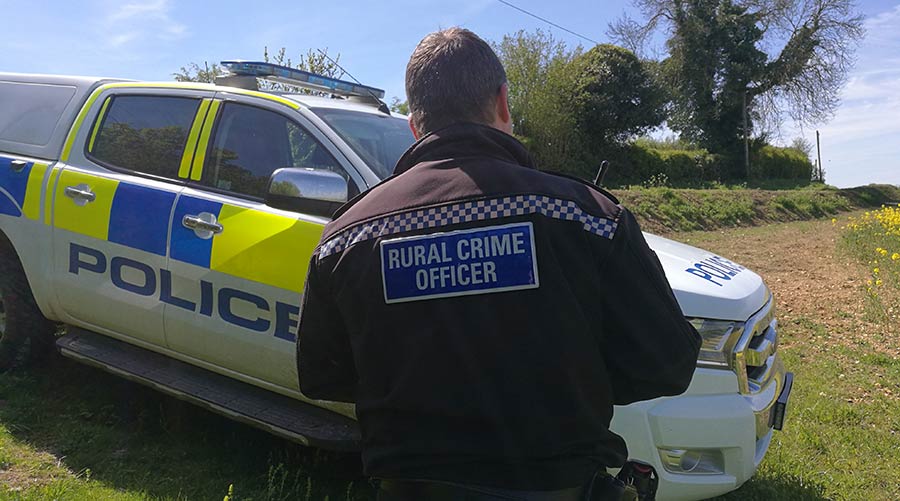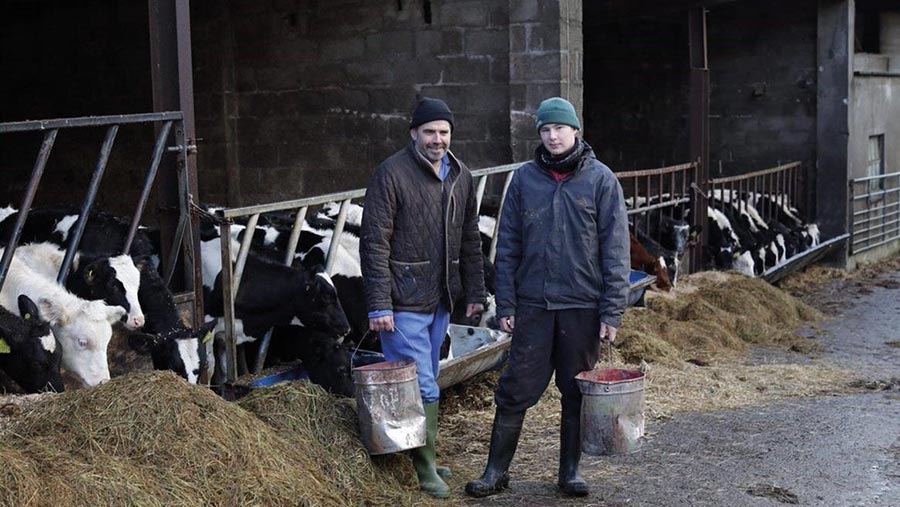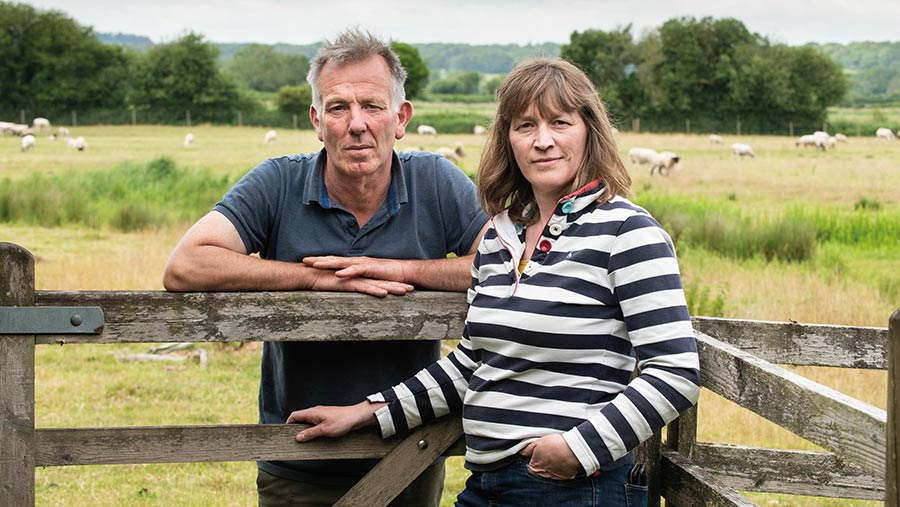Rural crime falls but farms still at risk from ‘slicker’ thieves
 © MAG/Philip Case
© MAG/Philip Case Rural crime rates have dropped to their lowest level in five years according to the latest figures from NFU Mutual, which estimates the cost of farm theft at just over £43m in 2020.
Coronavirus lockdown restrictions, better rural policing and beefed-up on-farm security all helped contain the cost of crime in the countryside, with a 20% fall recorded in the past 12 months, the rural insurer has revealed in its 2021 Rural Crime Report, published on 3 August.
See also: Rural crime costs reach highest level in 8 years
However, farmers still need to be on their guard. Some individual items have proved more attractive than others, with the theft of high-value GPS systems rocketing to £2.9m – almost twice the previous year’s figure.
The cost of agricultural vehicle theft reported to the rural insurer remained at more than £9m. Quad bike and ATV theft was valued at £2.5m.
Criminals have been becoming ever more inventive, with electric scooters used in the North West to swoop on farms at night, to steal the expensive GPS domes.
Thieves escaped down country lanes on the almost-silent scooters, which were modified to cover lights and reflectors, before putting them in the boot of a waiting car, says detective constable Chris Piggott, who specialises in agricultural machinery crime at the National Vehicle Crime Intelligence Service.
However, while the total number of theft claims decreased, the average cost of a claim rose to £4,425 – up from £4,128 in 2019.
According to DC Piggott, criminals are getting more adept at overcoming security systems on modern farm machinery.
“The pattern we are increasingly seeing is of gangs who patiently watch farms from a distance to discover where expensive tractor GPS kit is stored. They generally return at night to steal.
“Thieves are also becoming even slicker stealing quad bikes – watching for hours to rush into farmyards and steal them when they are left unattended for a few minutes.”
Cost change of rural theft across UK
- East Anglia, £6.4m: -20.5%
- Midlands, £7.9m: -25.3%
- North East, £7.8m: -9.7%
- North West, £3.7m: +3.3%
- Northern Ireland, £2.1m: -36.9%
- Scotland, £1.7m: -25.0%
- South East, £7.1m: -18.6%
- South West, £5.1m: -23.7%
- Wales, £1.6m: -39.4%
Livestock worrying
Other rural crimes, including dog attacks on livestock and fly-tipping, rose sharply last year.
The value of sheep and cattle attacked by dogs was up 10% to £1.3m in 2020 – a year which saw a surge in pet ownership and countryside visits as a direct consequence of the coronavirus lockdown, which still allowed people to head out for daily exercise.
NFU Mutual says the situation continues to worsen – initial claims data shows the cost of attacks on livestock rose 50% in the first quarter of 2021, compared with the same period last year.
Conversely, livestock theft fell sharply in 2020 – down 25% to a cost of £2.3m, with NFU Mutual suggesting that emptier roads during lockdown made it harder for thieves to make off with vehicles full of stolen animals.
South-west England proved an exception to the rest of the UK, with the incidence of sheep rustling increasing by more than one-third.
Impact on farmers
Rebecca Davidson, rural affairs specialist at NFU Mutual, says that although the rate of crime seems to have fallen, it continues to have a major psychological impact.
“From the farmers we’ve spoken to it’s hit people harder as they had so many other challenges to contend with – plus it was bigger, more organised thefts that took place.”
Ms Davidson is concerned that, as the economic impact of the pandemic bites, rural theft may escalate significantly in future.
“While lockdown may have locked some criminals out of the countryside, rural crime hasn’t gone away,” she says. “Thieves are now returning armed with new tactics and targets.”
The rural insurer said it will invest more than £430,000 this year in local, regional and national initiatives to help tackle of rural crime, while it is also involved in bringing back stolen machinery from overseas.
“There is no doubt that when we work together with police, farmers, communities and other rural organisations to tackle rural crime, it can make a real difference,” says Ms Davidson.
Hardest-hit regions
On a county-by-county basis, Lincolnshire retains its top spot as the worst affected county, by cost, followed by Cambridgeshire, Essex and Suffolk.
Conversely, the report says the biggest percentage falls in the cost of rural theft were in Wales (-39% to £1.6m), Northern Ireland (-37% to £2.1m) and Scotland (-25% to £1.7m).
The NFU Mutual headline figures are based on the company’s own claims data, plus an estimate built in to account for uninsured losses and claims covered by other companies.
GPS kit worth £16,000 stolen in overnight raid

James Weeks with son Eddie © James Weeks
North Devon dairy farmer James Weeks had two tractor GPS kits, worth £16,000, stolen in a night raid on his farm in June.
Mr Weeks, who is the third generation on the family-run farm, says his son had been out in the yard at around midnight the night before to check on the calving cows, so the thefts would have happened sometime between then and when they were out milking.
“They had taken the domes from the tractors and one of the screens. They knew what they were looking for.
“What really hits home is that someone has actually targeted our farm. People say equipment theft, like this, is a victimless crime, but it’s not – it’s an invasion of our property and the farm is also our home.”
Mr Weeks says his wife cried when she found out and couldn’t believe it had happened. “It was a cross between tears and anger.
“We have never lost anything of this nature and, until now, we have never felt that we live in an unsafe area.
“I always try to treat everyone in the same way I would like to be treated, but, unfortunately, when something like this happens, you start to see everyone as a potential threat.”
30 sheep taken under cover of darkness

© NFU Mutual
Richard and Hazel Hoskin have a 480ha mixed farm with beef, sheep and arable land near Dorchester, Dorset.
They have been the victims of livestock theft on three separate occasions.
Most recently, a few months ago, thieves stole about 30 lambs from a field on the outskirts of the town.
The 12-month old ewes were herded into a white transit van which was fitted with fake number plates so it couldn’t be traced.
“The sheep were located on land just outside the town and we had been checking on them every day,” says Mr Hoskin.
“Originally, there had been about 120 in the field and we had moved half of them. When we went down to check on them one morning, we realised around half were gone. It was a shock.
“Police checked the CCTV cameras in the area and the white Transit van used could be seen on the footage – along with its fake plates.”
Mr Hoskin believes the criminals had planned the theft well in advance.
“Rounding up that many sheep is not a quick and easy task. It’s quite likely they brought dogs with them, so they would be able to gather the sheep up quickly.
“It makes me angry that someone could come in and do this. They are pretty clever and obviously know what they are doing.”
For Mrs Hoskin, the theft has sparked a mix of emotions, leaving her demoralised by the amount of work that had been put into rearing the sheep, and distressed at the thought of what happens to the lambs after they have been stolen.
“The lambs were probably stolen to order and so they would have all been packed into that van without food or water – there would have been no welfare standards at all. We can only imagine what happens next to them.”
Advice on rural security
Physical
- Keep farm vehicles out of sight. Lock them up and remove keys
- Block or fill in access points that aren’t regularly used
- Cut down overgrown planting that provides cover for thieves to carry out surveillance
- Store tools in security cages and anchor down quad bikes
- Remove GPS systems wherever possible and mark kit with indelible ink
Technology
- Use sensors on access routes to your property
- Speak to police about the most appropriate CCTV for your farm
- Fit trackers and immobilisers to quad bikes and tractors
- Use floodlights and movement detection alarms on farm buildings
- Use Cesar Scheme vehicle marking to deter thieves and maximise recovery chances
- Fit tank alarms to alert you to attempts to steal farm fuel
Community
- Join your local Rural and Farm Watch schemes
- Use closed WhatsApp groups to share information about local criminal activity
- Keep in contact with your neighbours and get to know your local rural crime team
- Report all crimes and suspicious sightings to police
- Use the Crimestoppers number to report rural crimes anonymously
